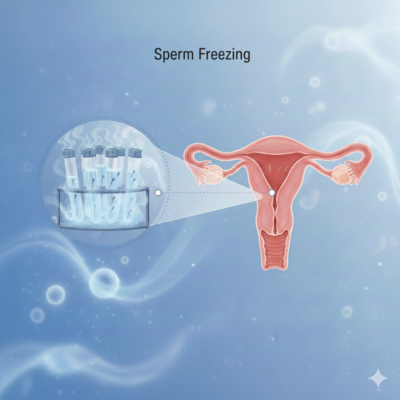Frequently Asked Questions
What is sperm freezing?
Sperm freezing, also called sperm cryopreservation, is the process of preserving sperm cells by cooling them to sub-zero temperatures (-196°C) in liquid nitrogen for future use in fertility treatments.
Why would someone freeze their sperm?
Common reasons include:
- Medical treatments: Before chemotherapy, radiation, or surgeries that might affect fertility.
- Aging: Men may wish to preserve their fertility as they get older.
- Low sperm count or quality: To store sperm when levels are still sufficient.
- Lifestyle choices: For those not ready to have children but want the option in the future.
- Occupational risks: Men working in hazardous environments that could affect fertility.
How is sperm collected for freezing?
The sperm is usually collected through masturbation, although alternative methods such as testicular biopsy or electro ejaculation may be used if necessary.
What are the success rates of using frozen sperm?
Success rates depend on factors like the quality of sperm, the woman’s age, and the fertility treatment used. Frozen sperm can be successfully used for In Vitro Fertilization (IVF) or Intrauterine Insemination (IUI).
Is frozen sperm as effective as fresh sperm?
Yes, frozen sperm can be as effective as fresh sperm for fertility treatments. Advances in cryopreservation techniques allow sperm to remain viable after thawing.
How long can sperm be stored?
Sperm can be stored indefinitely if kept in proper cryogenic conditions. There have been successful pregnancies using sperm stored for over 20 years.
Is there any risk of damage to the sperm?
The freezing and thawing process can cause some sperm cells to die, but a sufficient number usually survive for fertility treatments.
Does freezing sperm affect the baby’s health?
There is no evidence that babies conceived using frozen sperm have any higher risk of birth defects compared to those conceived naturally.
How much does sperm freezing cost?
The cost of sperm freezing in India typically ranges from ₹40,000 to ₹80,000 for the initial freezing process. After that, storage fees are around ₹15,000 to ₹40,000 per year, depending on the clinic.
Can I use my frozen sperm if I pass away?
This depends on the consent and legal agreements in place. Some men choose to give written consent for their sperm to be used posthumously.
How many samples should I freeze?
Freezing multiple samples is recommended to ensure enough viable sperm for future fertility treatments. Doctors often recommend 3–5 samples, but the number may vary based on sperm count.
Can sperm be frozen if it has a low sperm count?
Yes, even sperm with low count or motility can be frozen and used in treatments like IVF where only a few viable sperm are needed.
Can I freeze sperm at home?
Home sperm freezing kits exist, but it’s generally recommended to freeze sperm at a medical facility for proper handling and storage.
What happens if I decide not to use my frozen sperm?
Options include continuing storage, donating to a sperm bank, or having the sperm disposed of, depending on your preference and the regulations of the storage facility.

